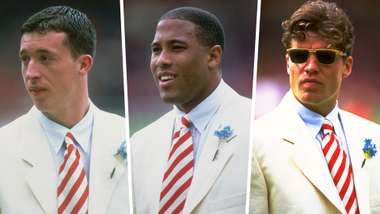Liverpool have pulled themselves back to the summit of English and European football over the course of the past two decades, but the 1990s were a particularly forgetful period.
Indeed, when football fans think about the Reds during the 1990s at the dawn of the Premier League era, 'Spice Boys' may be the most memorable thing that pops into their heads.
So, who were the 'Spice Boys' and how did the nickname come about? Goal takes a look.
Who were Liverpool's 'Spice Boys'?
'Spice Boys' is the name given to a group of Liverpool players who played for the club during the mid 1990s.
The group included Robbie Fowler, Steve McManaman, Jason McAteer and Jamie Redknapp, as well as the likes of John Scales, Phil Babb and David James.
Others, such as Stan Collymore and Paul Ince, have also been considered a part of Liverpool's 'Spice Boys' group.
Why were they called 'Spice Boys'?
The nickname 'Spice Boys' which was attached to the Liverpool players in that period was a play on the name of the popular girl band the Spice Girls.
A pejorative, it was coined by British tabloid newspaper the Daily Mail, and it riffed off speculation linking Fowler with Spice Girls band member Emma Bunton.
The connotations of the nickname were generally negative, associating those dubbed thus with a lifestyle of hedonism and narcissism.
Indeed, the so-called 'Spice Boys' became a regular feature on the front page as well as the back page of newspapers due to their socialising, which saw them rub shoulders with various entertainment stars.

As well as the depiction of their night-time revelry in the daily newspapers, the fact that a number of players had become models for shampoo (McAteer) and designer clothing (James) contributed to a perception that they were not concerned enough about their football.
The defining image of the 'Spice Boys' era came ahead of the 1996 FA Cup final, when the team donned a striking white suit to Wembley before going on to lose the game to Manchester United.
That is a reputation that McAteer feels was unjustified, suggesting that the Liverpool footballers were no different to any other group of players from the Premier League's big clubs.
"The fact is we were a very professional bunch of lads and didn't deserve the reputation that the nickname gave us," the former midfielder told the Daily Mirror.
"We got it because people saw us as under-achievers who liked to go out.
"There was a social culture in football at the time. We were doing nothing more than the players at Arsenal or Manchester United."

However, Scales suggests that they did not help themselves, referencing the appearance of Robbie Williams on the team coach before and then after a loss to Aston Villa.
“Robbie was a great lad and we had some laughs. But why was he there on match days?" Scales told the Daily Telegraph.
"He was going through his exit from Take That. His drink and drugs problems were well known. How can you have someone in that situation on the coach going to games? Why the hell was it allowed to happen?
"It fuelled the whole Spice Boy thing. We all hated the tag but the truth always hurts, doesn’t it?
"I know I could have done more to avoid it. All the boys could have."
How successful were Liverpool's 'Spice Boys'?
Liverpool's 'Spice Boys' only managed to deliver one trophy - the League Cup (then known as the Coca-Cola Cup) in 1995, so they were not very successful.
Indeed, the 1990s as a whole were not a particularly successful period for Liverpool, who, under Graeme Souness and then Roy Evans, struggled to match their dominance of the 1980s.
They finished sixth in 1993, then slid to eighth in 1994, with their highest finishing position in the decade being third (in 1996 and 1998).
Of course, they reached the final of the FA Cup in 1996, infamously donning the white suits on the turf of the Home of Football, only to get beaten by Alex Ferguson's Manchester United.
The appointment of Gerard Houllier as Reds boss in 1998 led to a drastic change in standards at the club and many of those who fell into the 'Spice Boy' category were moved on.



